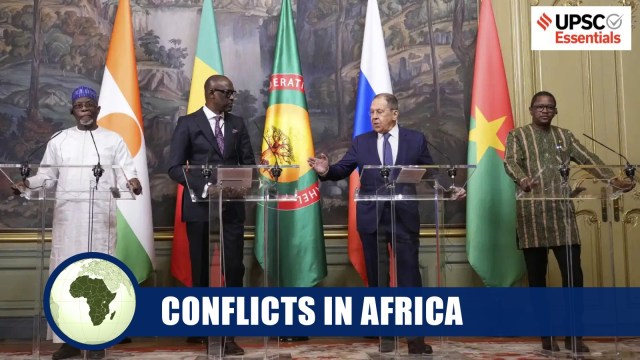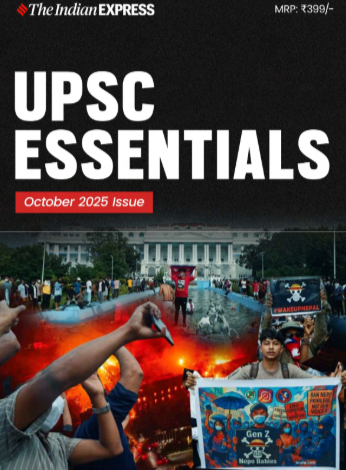© IE Online Media Services Pvt Ltd
Latest Comment
Post Comment
Read Comments
 From left, Niger Foreign Minister Bakary Yaou Sangare, Mali's Foreign Minister Abdoulaye Diop, Russian Foreign Minister Sergey Lavrov and Burkina Faso Foreign Minister Karamoko Jean Marie Traore attend a joint news conference following a meeting of Russian foreign Minister with foreign Ministers of the Confederation of Sahel States in Moscow, Russia, Thursday, April 3, 2025. (AP Photo/Pavel Bednyakov, Pool)
From left, Niger Foreign Minister Bakary Yaou Sangare, Mali's Foreign Minister Abdoulaye Diop, Russian Foreign Minister Sergey Lavrov and Burkina Faso Foreign Minister Karamoko Jean Marie Traore attend a joint news conference following a meeting of Russian foreign Minister with foreign Ministers of the Confederation of Sahel States in Moscow, Russia, Thursday, April 3, 2025. (AP Photo/Pavel Bednyakov, Pool)— Samir Bhattacharya
(From civil wars and insurgencies to ethnic tensions and resource-based disputes, Africa has long been a continent marked by conflicts, resulting in widespread instability and humanitarian crises. The region is also becoming a battleground for global power struggle. In the Conflicts in Africa series, our experts explore the root causes of major African conflicts and their impact on India’s interests. They will also examine prospects for a peaceful future in the continent.)
While US President Donald Trump’s tariffs are resetting the global trading order, Africa is recalibrating its alliance with the West to move closer to Russia. In recent years, the Sahel region experienced deterioration in the security situation caused by the dwindling presence of the US and France. Capitalising in this shift, Russia has expanded its influence with the countries in the Sahel – the vast expanse south of the Sahara Desert.
Earlier this month, the foreign ministers of the three West African junta-led countries – Burkina Faso, Mali, and Niger – travelled to Moscow and met with the Russian Foreign Affairs Minister Sergei Lavrov. The meeting was aimed at establishing strategic relations in areas of common interest. Following the meeting, Russia expressed its readiness to help strengthen the military and security forces of the three countries.
But how did this drift begin? What factors have led to the weakening of US and French influence in the Sahel region? Why are three African nations seeking closer military ties with Russia? Let’s understand.
Sahel is drifting into the Russian orbit, partly by choice. However, the choice of Russia as the preferred external partner for the Sahel is not difficult to grasp. The three West African nations, where coups in recent years brought juntas to power, formed a body called the Alliance of Sahel States or L’Alliance des États du Sahel (AES) in September 2023.
The announcement of the alliance took place in the presence of a Russian delegation led by Deputy Defence Minister Yunus-Bek Yevkurov. Russia is the first country to recognise the AES with the promise of security cooperation. From the beginning, the Alliance was poised to be more than just a security or military agreement. In early 2024, the AES countries upgraded their security alliance to a confederation.
Since then, the confederation has taken several bold steps to redefine its international alignment, including withdrawals from several neutral or Western-aligned regional political and security institutions. In early 2025, the AES formally withdrew from the West African political and economic bloc ECOWAS (Economic Community of West African States).
The AES countries also left security alliances, such as the Sahel G5 and Multinational Joint Task Force in the Lake Chad Basin, which are two African Union, UN, and Western-backed military missions meant to combat Salafi-jihadi terrorism. The disengagement hints at the AES countries’ disenchantment with Western-led security frameworks, including the ones anchored by France.
Since the 1960s, France has sustained close ties with the French-speaking countries of the region, positioning itself as the principal security provider. This historic tie has translated into a series of military interventions aimed at stabilising the region.
In 2013, France launched a military intervention known as Operation Serval, aimed at addressing the growing threat of Islamist militancy in Mali. This operation was succeeded in 2014 by a more extensive and long-term initiative, Operation Barkhane, which expanded the scope of French military engagement across the broader Sahel region.
However, France has recently faced violent protests in all three AES countries as well as other francophone countries in the region. Facing fierce public animosity, France was forced to withdraw its troops from the AES countries, followed by neighbouring Chad, Senegal and Côte d’Ivoire. Today, France has only two military bases in Africa: Gabon and Djibouti.
Meanwhile, modest security assistance provided by the US as part of its trans-Sahara counterterrorism policy tool proved inadequate in the conflict-ridden Sahel region.
This rapidly deteriorating security situation in the Sahel, caused by the US and France’s dwindling presence there, has made room for several new players, notably Russia. Many countries in the region continue to nurture a soft spot for Russia, recalling how the Soviet Union supported their liberation struggle.
The three regimes had already broadly coordinated their diplomatic activity in line with their anti-Western outlooks. They emphasised the need to speak with “one voice,” The AES states have coordinated other major efforts to integrate in the last year, such as a united passport, joint tariffs, and a joint force to address the Salafi-jihadi insurgency that has spread across all three countries.
However, the recent joint visit marks another step in the bloc’s efforts to form a true multi-sectoral confederation that aims to coordinate diplomatic, economic, and military policies. It is also the bloc’s highest-ever level of joint diplomatic engagement with an external partner, in this case, Russia.
With its focus on collective defence and a framework of mutual assistance, the AES is increasingly aligning itself with the characteristics of an “African NATO”. In the future, with Russian support, AES may consider inviting nations to be observers and conducting joint military and counterterrorism simulation exercises to promote unity that can build a non-western regional security partnership.
Further, the AES may potentially draw many other countries of the region into Russia’s sphere of influence. For example, Chad and Togo expressed their interest in joining the AES to enhance regional cooperation and provide maritime access to the landlocked Sahel countries.
In May 2024, Chad and Togo participated in joint military exercises with the AES. In November, Chad annulled its defence agreements with France followed by the Russian pledge to provide the country with an alternative security partnership. And French troops completed their withdrawal from Chad by the end of January 2025.
Similarly, in February 2025, Sudan and Russia reached a preliminary agreement to revive a stalled 2017 deal that would allow Russia to establish a naval base on Sudan’s Red Sea coast, following Russia’s commitment to provide “unrestricted military aid” to the Sudanese Armed Forces (SAF) in April 2024.
Earlier, in June 2024, leaders of the Sudanese Armed Forces (SAF) visited Mali and Niger. As these nations increasingly align with the AES, their ties with Russia are also deepening. Notably, this growing alignment also represents a challenge for China.
The AES juntas have specifically targeted China in their pro-sovereignty campaign against international mining interests, expanding the scope of this campaign to include not only Western companies but also Chinese entities.
On March 15, 2025, Niger’s military junta expelled three Chinese oil executives, reportedly due to disputes over wage discrepancies for local Nigerien staff and delays in Chinese-led oil projects. Additionally, the Nigerien Ministry of Tourism revoked the operating license of a Chinese-owned hotel in Niamey, citing allegations of discriminatory practices.
China has been a significant player in Niger’s oil sector since the 2008 signing of a joint petroleum production agreement, holding substantial stakes in Niger’s largest oil field, its sole refinery, and the Niger-Benin oil pipeline, which was completed in 2023. The growing tendency of resource nationalism suggests that these countries seek more favourable terms in mining agreements.
As the competition between the US and China over influence in Africa intensifies, with both powers seeking increasingly deeper ties with the continent, the re-emergence of Russia provides these junta governments with an opportunity to balance their relations while reshaping the trajectory of their foreign policy.
On the other hand, Russia’s strengthened ties with African countries would enable the Kremlin to consolidate its influence and secure its interests. The nature of this interdependence is palpable in the burgeoning partnership between the Sahelian military governments and Russia.
Is Africa becoming the new arena for global power competition among the US, China, and Russia? Comment.
Evaluate the factors that enable Russia to emerge as a balancing force between US and Chinese influence in Africa?
What are reasons behind Africa’s growing disenchantment with the West as well as China? How could this potentially shape India-Africa partnership?
What are the implications of this foreign policy recalibration for Africa’s long-term development and security?
Could the Alliance of Sahel States (AES) emerge as a credible alternative to Western-backed security coalitions in Africa?
(Samir Bhattacharya is an Associate Fellow at the Observer Research Foundation.)
Share your thoughts and ideas on UPSC Special articles with ashiya.parveen@indianexpress.com.
Subscribe to our UPSC newsletter and stay updated with the news cues from the past week.
Stay updated with the latest UPSC articles by joining our Telegram channel – IndianExpress UPSC Hub, and follow us on Instagram and X.

Read UPSC Magazine







